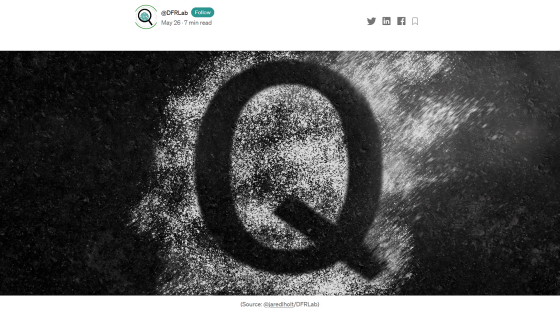Phrases related to the conspiracy theorist group 'QAnon' are disappearing from Twitter and Facebook.

by
The American far-right conspiracy theorist group ' QAnon ', whose roots are posted by 4chan , an anonymous overseas bulletin board, is known for its activities to spread conspiracy theories and fake news on social media. Many slogans and phrases related to QAnon are disappearing from mainstream social media, according to a survey by the Digital Forensic Research Lab (DFR Lab) , a research institute of the American think tank Atlantic Council.
QAnon's hallmark catchphrases evaporating from the mainstream internet | by @DFRLab | DFRLab | May, 2021 | Medium
https://medium.com/dfrlab/qanons-hallmark-catchphrases-evaporating-from-the-mainstream-internet-ce90b6dc2c55

QAnon slogans disappearing from mainstream sites, say researchers | Reuters
https://www.reuters.com/technology/qanon-slogans-disappearing-mainstream-sites-say-researchers-2021-05-26/
QAnon's supporters, who increased their presence on social media during the coronavirus infection (COVID-19) pandemic, frequently used catchphrases such as 'The Storm' and 'The Great Awakening.' I used it for. However, due to the effects of social media such as Facebook and Twitter cracking down on QAnon, and Donald Trump, who has been enthusiastically supported by QAnon supporters in January 2021, retired from the U.S. president. It is said that the influence is also declining.
Therefore, DFR Lab's research team collected QAnon-related remarks on various social media platforms from January 1, 2020 to April 1, 2021. The tools used for collection were Meltwater Explore , Social Media Analysis Toolkit (SMAT) , Parler Archive, and GabLeaks , covering a wide range of platforms, from mainstream social media such as Twitter to alternative SNS such as Parler.
The research team focused on 13 phrases and words widely used by QAnon supporters: 'WWG 1WGA (Where we go one we go all),' 'the storm,' 'great awakening,' 'trust the plan,' and 'dark to.' 'light' 'future proves past' 'disinformation is necessary' 'the military is the only way' 'we are the news' ' save the children ' ' Pizzagate ' ' Seth Rich ' 'there's Q and there's anons'. The research team seems to have increased the number of search words and collected them in consideration of spelling mistakes and subtle variations.

In this survey, we did not analyze the information of the person who made the statement, but focused on the number of statements extracted and the platform. The research team acknowledges that the statements collected may include statements from non-QAnon supporters, such as journalists who mentioned QAnon, but the error has a significant impact on the analysis. He thinks there are not many.
As a result of collecting comments from multiple social media, a total of nearly 40 million comments were collected. Looking at the graph below, which shows the number of remarks of each phrase on the vertical axis and the flow of time on the horizontal axis, 'WWG1WGA' and 'there's Q and there's anons' are particularly common among the phrases, depending on the pandemic of COVID-19. There is a tendency for it to increase from March 2020, when restrictions on going out began. After that

This is a graph focusing on the period after the summer of 2020. QAnon-related remarks are decreasing along with events such as '

Looking at the graph below, which shows the number of comments on mainstream platforms such as Twitter and Facebook in green and the number of comments on alternative platforms such as Parler and Gab in red, basically the number of comments on mainstream platforms rather than alternative platforms. You can see that is significantly higher. After the attack on the Capitol, when a large number of account BANs occurred on Twitter etc., the momentum of the alternative platform temporarily increased, but after that, the momentum soon subsided due to the exclusion of Parler etc. I did.

Of the statements collected in this analysis, about 97.6% were made on mainstream platforms, and only 2.4% were made on alternative platforms.

From the results of this study, the idea that 'QAnon supporters are using alternative platforms faster than mainstream platforms' is not true, and in fact there are not so many QAnon supporters gathering on alternative platforms. It has been suggested. The highest number of QAnon-related phrases on alternative platforms was about 211,000 on January 9, 2021, but on May 30, 2020, the highest number on mainstream platforms. It is said that more than 650,000 remarks were confirmed.
The crackdown on the platform was strongly related to the decrease in the number of statements related to QAnon, but since there is a movement to avoid the use of specific phrases inside QAnon, QAnon supporters are disappearing at the same momentum as the decrease in the number of statements. The research team points out that this is not the case. Research team Jared Holt also notes that research is limited to 'what has been considered as a hallmark of QAnon.'
Related Posts:
in Web Service, Posted by log1h_ik







